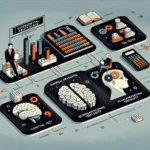The Differential Ability Scales (DAS) stands as an insightful tool utilized by psychologists, educational professionals, and related specialists to assess the cognitive abilities of children. The assessment is created with the primary intent to measure the cognitive strengths and weaknesses in children from ages 2 years 6 months to 17 years 11 months. The DAS provides a comprehensive evaluation of a child’s intellectual abilities, offering important information that can be used to support educational planning and identify any potential learning difficulties.
The scales were developed by British psychologist Colin D. Elliott, and their comprehensive nature has made them a preferred choice for many in the field of child psychology. The DAS is divided into two versions: the Preschool Level for ages 2 years 6 months to 5 years 11 months and the School-Age Level for children aged 6 years to 17 years 11 months. This broad range allows for an extensive understanding of a child’s cognitive development through various stages of their childhood.
**Core Subtests and Composite Scores**
The DAS encompasses a variety of individual subtests that focus on different cognitive domains. These domains include:
1. **Verbal Ability** – Evaluates expressive language, vocabulary, and the ability to understand concepts and solve problems verbally.
2. **Nonverbal Reasoning** – Measures the ability to solve problems using pictures and shapes instead of words, tapping into visual-spatial abilities and logical reasoning without the influence of language.
3. **Spatial Ability** – Assesses visual processing and the ability to understand complex spatial relationships.
When administered, the conglomeration of these subtests provides what’s known as the General Conceptual Ability (GCA) score. The GCA is analogous to the Full Scale IQ score given in other cognitive assessments and is considered a reliable estimator of a child’s overall intellectual abilities. Additionally, cluster scores, which represent specific cognitive domains, provide more detailed insight into a child’s strengths and weaknesses in areas such as verbal comprehension and visual-motor coordination.
**Diagnosis and Educational Planning**
One of the most significant applications of the DAS is in the realm of special education. By identifying specific learning disabilities or exceptional cognitive strengths, educators can tailor educational programs that cater to the unique needs of each child. The DAS can help in diagnosing various conditions such as Attention Deficit Hyperactivity Disorder (ADHD), dyslexia, and other processing disorders. It can also be instrumental in the identification of intellectually gifted children, ensuring they receive the proper stimulation and challenges needed for their cognitive growth.
Early identification of potential difficulties is critical as it allows for intervention strategies to be implemented, which can mitigate future educational challenges. Moreover, the DAS assists in tracking the developmental progress of children, providing parents and educators with necessary benchmarks for evaluating the effectiveness of interventions or instructional approaches.
**Cultural Fairness and Adaptability**
An advantage of the DAS is its attempt to minimize cultural and linguistic biases. The inclusion of nonverbal reasoning and spatial ability subtests helps provide a balanced assessment of children who may come from diverse linguistic backgrounds or who have limited proficiency in English. This can help ensure that the assessment does not unfairly disadvantage children whose first language isn’t English, offering a fuller picture of their cognitive abilities.
However, it’s important to note that while the DAS takes steps to reduce cultural biases, no cognitive assessment can claim to be entirely free from cultural influence. It’s crucial for assessors and educators to be aware of these potential limitations and interpret the results in the context of the child’s background and experiences.
**Practical Administration and Interpretation**
The DAS is structured to be administered in a flexible manner, allowing examiners the choice to administer only specific subtests relevant to their assessment goals. This flexibility also makes it less time-consuming and more adaptable across various situations. Results provided by the DAS are comprehensive and are often presented with clear graphs and charts for ease of interpretation.
Interpreting the results of the DAS involves a detailed analysis of the scores across different subtests and comparing them with norms based on the child’s age. Professionals trained in psychological assessment are equipped to identify patterns within these scores that could indicate learning disabilities, cognitive delays, or advanced abilities.
**Future Directions and Continuing Relevance**
The field of cognitive assessment continuously evolves, and with it, tools like the DAS are regularly updated and revised to ensure they remain relevant and reliable. Ongoing research contributes to the improvement of assessment tools to make them more effective and reflective of the diverse populations they serve.
As we look towards the future, the role of cognitive assessments like the DAS will likely expand. With advances in technology, these assessment tools may incorporate more digital components that can enable more interactive, engaging, and precise testing environments. Such advancements can lead to quicker turnaround times for results and more dynamic ways of capturing a child’s cognitive profile.
**Final Thoughts**
In conclusion, the Differential Ability Scales serve as a vital instrument in the assessment of child cognitive abilities. Providing a nuanced and diverse measure of cognitive strength and weaknesses, the DAS supports educational planning, diagnosis of learning disabilities, and the nurturing of giftedness across various developmental stages. Its adaptability and attention to cultural fairness enhance its value as a widely respected tool in psychological and educational settings. With the ongoing developments in cognitive assessment, the DAS is sure to maintain its importance in understanding and supporting the cognitive development of children across the globe.

